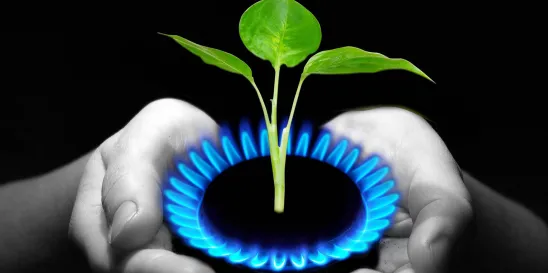In April 2023, we reported on the US Court of Appeals for the Ninth Circuit’s decision in California Restaurant Association (CRA) v. City of Berkeley striking down a Berkeley ordinance that prohibited natural gas piping in new buildings. The Ninth Circuit found that the federal Energy Policy and Conservation Act (EPCA) preempts state and local laws that directly apply to products that use natural gas as well as laws that affect related on-site infrastructure like piping. Since then, the Ninth Circuit denied Berkeley’s request to rehear the case and affirmed its decision. The debate over the use of natural gas in residential and commercial buildings has continued to play out throughout the country. In this alert, we provide an update on the Ninth Circuit’s ruling in CRA and discuss efforts at the federal and state levels to address the use of gas for heating and appliances in the case’s aftermath.
Looking forward, these issues will continue to have impacts on energy markets and the development of infrastructure as governments stake positions for and against natural gas and attempt to impact the industry through legislation and regulation.
NINTH CIRCUIT AFFIRMS THAT FEDERAL LAW PREEMPTS BERKELEY GAS BAN
On 2 January 2024, the Ninth Circuit voted to deny rehearing of the CRA case by the full court and affirmed its prior decision in an amended opinion.1 In doing so, the court emphasized that EPCA preemption may apply narrowly, i.e., to building codes that target the on-site use of natural gas, and signaled that state and local governments may have broader authority to regulate utility distribution of natural gas.2 This distinction—regulation before versus after the point of delivery—could provide a path for the curtailment of natural gas use without conflicting with EPCA.3
At this point, the City of Berkeley’s only option for keeping the case alive is an appeal to the US Supreme Court. It has until 1 April 2024 to seek that review by filing a petition for certiorari.4
THE GAS BAN DEBATE TAKES THE NATIONAL STAGE AND THE DEPARTMENT OF ENERGY TAKES ACTION
The debate over the use of natural gas for heating and cooking has also reached the national stage. In January 2023, for example, in response to a December 2022 study that linked gas stoves in homes to childhood asthma cases, Commissioner Richard Trumka Jr., of the US Consumer Product Safety Commission (CPSC), said the agency was considering ways to make gas stoves safer in homes—including by potentially issuing a ban on new gas stoves.5 Shortly thereafter, CPSC Chair Alexander Hoehn-Saric refuted that the agency was considering such a ban.6 Trumka’s comments resulted in significant angst on Capitol Hill about Biden administration efforts to place restrictions on gas stoves that could restrict consumers’ choices in home appliances.
More recently, in October 2023, the US Department of Energy (DOE), acting under its EPCA authority, issued a final rule to tighten efficiency standards for commercial gas and electric water heaters.7 Manufacturers and importers must comply with this rule starting 6 October 2026.8
Then, in December, also pursuant to EPCA, DOE issued a final rule to tighten efficiency standards for residential gas furnaces and issued a supplemental notice of proposed rulemaking to tighten standards for consumer water heaters.9 Members of the Senate Western Caucus have since introduced a resolution disapproving of the final rule contending it effectively requires the use of heat pumps in residences.10 Manufacturers and importers must comply with the gas furnace rule starting 18 December 2028, and the water heater rule within five years of the final rule.11
Most recently, on 29 January 2024, DOE issued a final rule setting tighter efficiency standards for both electric and gas stoves and ovens.12 The final rule was significantly scaled back from the proposed rule, which had inflamed members of Congress when it was proposed in February 2023, especially in the aftermath of Commissioner Trumka’s comments.13 In the final rule, DOE estimates the efficiency standards will reduce carbon dioxide emissions by 0.06 metric tons through 2030, the equivalent of the annual emissions from 11,000 homes.14 According to DOE, the standards will allow new models to maintain “consumer-desired features,” like continuous cast-iron grates and high-input rate burners and only require a “small portion of models” to make changes to their energy efficiency to “match the level of efficiency already demonstrated by the majority of the market today.”15 Indeed, DOE states that “approximately 97 percent of gas stove models and 77 percent of smooth electric stove models on the market already meet these standards.”16 Manufacturers and importers must comply with these standards for newly manufactured (including imported) models starting 31 January 2028.17
STATES ATTEMPT TO MOVE FORWARD WITH NATURAL GAS BANS
State and local governments outside of Berkeley have continued to take actions to curb natural gas use in commercial and residential settings. On 7 February 2024, energy officials from nine states, including California, Colorado, Maine, Maryland, Massachusetts, New Jersey, New York, Oregon, and Rhode Island, signed a memorandum of understanding to set a shared goal to deploy heat pumps in 65% of new buildings by 2030 and 90% of new buildings by 2040.18 Some of these states have already taken legislative steps towards enacting this goal.
On 7 May 2023, New York became the first state to pass legislation prohibiting “fossil-fuel equipment” in new buildings.19 The New York law goes into partial effect in 2026, applying initially to only certain buildings, and expands to all new buildings in 2029 with limited exemptions.20
Opposition to the New York gas ban has quickly mounted. In October 2023, gas utilities filed a lawsuit seeking an injunction relying on the same EPCA preemption argument that was successful in the Ninth Circuit.21 This challenge remains pending. If the New York law is upheld, it could set up a circuit split that could find its way to the US Supreme Court.
On the other side of the country, the Washington state legislature took a run at what was a first-of-its-kind gas ban at the state level in 2021.22 It did not pass then, but it was in line with the state’s many efforts to reduce greenhouse gas emissions. The state has, for example, set a goal to reduce building greenhouse gas emissions by 70% by 2031, using the 2006 Washington State Energy Code as the baseline.23 To help achieve this goal, the legislature passed the 2019 Clean Buildings for Washington law.24 To maximize reductions in greenhouse gas (GHG) emissions, the law directs the Washington Department of Commerce to establish energy use intensity targets for the largest existing buildings (greater than 50,000 square feet) in the state.25 It was amended in 2022 to cover “Tier 2 buildings,” or buildings between 20,000 and 50,000 square feet.26 Other Washington examples include the 2019 Clean Energy Transformation Act, a program to reach zero-GHG-emission electricity by 2045, and the 2021 Climate Commitment Act, a cap-and-invest program designed to reduce statewide GHG emissions by 95% by 2050.27
After the Washington legislature failed to enact a state-level gas ban in 2021, the State Building Code Council (SBCC), an executive agency, implemented revisions to the state’s building code to achieve a similar result. Those code amendments prohibited, with limited exceptions, fossil-fueled commercial heating, ventilation, and air conditioning (HVAC) systems and required electric heat pumps for service hot water effective 1 July 2023.28
In response to the CRA decision, SBCC delayed implementation of those code revisions to consider amendments meant to avoid potential EPCA preemption issues.29 On 18 October 2023, SBCC released a revised code that no longer expressly prohibits fossil-fueled HVAC systems or requires the use of heat pumps, but instead sets energy efficiency requirements on a scoring system dependent on the building’s size.30 It goes into effect on 15 March 2024.31
Legal challenges to this version of the code are already brewing. At least one trade association has argued that, because of how stringent the standards are, the new code is effectively a ban on natural gas appliances, and therefore is preempted by EPCA.32 While making it more difficult to use gas appliances, SBCC’s new code does not explicitly prevent their use. Eventually, a court will likely be asked to decide whether a code that does not explicitly ban the use of natural gas appliances or related infrastructure passes EPCA muster.33 Trade associations renewed their petition for declaratory judgment to invalidate the revised code on 29 January 2024.34 Judge Carol Murphy will hear a motion to stay implementation of the revised code pending litigation on 1 March 2024.35
Perhaps taking a hint from the Ninth Circuit, the Washington legislature is also looking at curbing natural gas consumption by targeting gas distribution. Recently, on 22 January 2024, the Washington House of Representatives passed H.B. 1589. If enacted, the law would prohibit utilities in large metropolitan areas from providing natural gas service to new customers.36 It would also eliminate a gas company’s “obligation-to-serve” in these areas.37 This would mark a significant change in, and departure from, foundational public utility law in Washington state—as well as many other states across the country that have a similar “obligation-to-serve” framework governing the state public utilities.
H.B. 1589 is different from the local ordinance struck down in CRA in at least one key respect. Rather than regulating gas appliances or their on-site infrastructure, it regulates gas utility services by state-regulated entities. As the Ninth Circuit noted in CRA, this type of regulation may be outside EPCA’s preemptive scope.38
The bill has been approved by the Senate Committee on Environment, Energy & Technology with a potentially significant amendment. The amended bill would remove the prohibition on serving new natural gas customers but would permit utilities to fulfill their duty to serve by “providing a customer with nonemitting energy including, but not limited to, renewable natural gas, green hydrogen, thermal energy networks, electricity, or other sources as described in an integrated system plan approved by the commission.”39
The bill is in the Rules Committee for review. From there, it would need to be approved by the full Washington Senate and the changes approved by the Washington House before the end of the legislative session on 7 March. If it passes both chambers by the deadline, the governor will have until 27 March to sign the bill into law and it would be effective immediately.
And in indications of more battles to come, the International Code Council (ICC), the organization that creates widely used baselines for building safety and sustainability, proposed for its 2024 model standards to recommend the use of heat pumps and electric vehicle charging infrastructure in new buildings.40 ICC heard appeals to these revisions by industry representatives from 21-23 February 2024.41
AUDIO VERSION
FOOTNOTES
1California Restaurant Association v. City of Berkeley, 89 F.4th 1094, 1098 (9th Cir. 2024).
2 Id. at 1103 (“[O]ur holding here has nothing to say about a State or local government regulation of a utility’s distribution of natural gas to premises where covered products might be used.”).
3Id. at 1098 (“EPCA preempts Berkeley’s building code because it prohibits natural gas piping in new construction buildings from the point of delivery at the gas meter.”).
4 U.S. Dep’t of Just., Just. Manual § 2-4.211 (2018).
5 Ari Natter, US Safety Agency to Consider Ban on Gas Stoves Amid Health Fears, BLOOMBERG (Jan. 9, 2023, 7:00 AM), https://www.bloomberg.com/news/articles/2023-01-09/us-safety-agency-to-consider-ban-on-gas-stoves-amid-health-fears; Talor Gruenwald, Population Attributable Fraction of Gas Stoves and Childhood Asthma in the United States, INT’L J. OF ENV’T RSCH. & PUB. HEALTH (Dec. 21, 2022).
6 @HoehnSaricCPSC, TWITTER (Jan. 11, 2023, 7:46 AM), https://twitter.com/HoehnSaricCPSC/status/1613200634194415616.
7 Energy Conservation Program: Energy Conservation Standards for Commercial Water Heating Equipment, 88 Fed. Reg. 69686 (Oct. 6, 2023) (to be codified at 10 C.F.R. pt. 431).
8 Id.
9 Energy Conservation Program: Energy Conservation Standards for Consumer Furnaces, 88 Fed. Reg. 87502 (Dec. 18, 2023) (to be codified at 10 C.F.R. pt. 430); Energy Conservation Program: Energy Conservation Standards for Consumer Water Heaters, 88 Fed. Reg. 89330 (Dec. 27, 2023) (to be codified at 10 C.F.R. pt. 430) (Supplement to Energy Conservation Program: Energy Conservation Standards for Consumer Water Heaters, 88 Fed. Reg. 49058 (Jul. 28, 2023) (to be codified at 10 C.F.R. pts. 429, 430)).
10 A Joint Resolution Providing for Congressional Disapproval Under Chapter 8 of Title 5, United States Code, of the Rule Submitted by the Department Of Energy Relating to "Energy Conservation Program: Energy Conservation Standards for Consumer Furnaces,” S.J. Res. 58, 118th Cong. (2024).
11 Energy Conservation Program: Energy Conservation Standards for Consumer Furnaces, 88 Fed. Reg. 87502; Energy Conservation Program: Energy Conservation Standards for Consumer Water Heaters, 88 Fed. Reg. 89330.
12 Energy Conservation Program: Energy Conservation Standards for Consumer Conventional Cooking Products, 89 Fed. Reg. 11434 (Feb. 14, 2024) (to be codified 10 C.F.R. pt. 430) (Direct Final Rule).
13 Id.; Energy Conservation Program: Energy Conservation Standards for Consumer Conventional Cooking Products, 88 Fed. Reg. 6818 (Feb. 1, 2023) (to be codified at 10 C.F.R. pts. 429, 430). DOE issued the final rule as a direct final rule and simultaneously published a Notice of Proposed Rulemaking (NOPR) that contains identical standards. Interested parties have until 15 March 2024 to submit comments. If those provide a reasonable basis for doing so, DOE will withdraw the direct final rule and proceed under NOPR. Energy Conservation Program: Energy Conservation Standards for Consumer Conventional Cooking Products, 89 Fed. Reg. 11548 (Feb. 14, 2024) (to be codified 10 C.F.R. pt. 430) (Notice of Proposed Rulemaking).
14 Id.
15 U.S. Dep’t of Energy, DOE Finalizes Cost-Saving Efficiency Standards for New Cooking Products, Based on Recommendations from Manufacturers and Consumer Advocates, ENERGY.GOV (Jan. 29, 2024), https://www.energy.gov/articles/doe-finalizes-cost-saving-efficiency-standards-new-cooking-products-based-recommendations#:~:text=The%20efficiency%20standards%20being%20adopted,including%20manufacturers%2C%20the%20manufacturing%20trade.
16Id.
17 U.S. DEP’T OF ENERGY, ENERGY CONSERVATION PROGRAM: ENERGY CONSERVATION STANDARDS FOR CONSUMER CONVENTIONAL COOKING PRODUCTS, EERE-2014-BT-STD-0005.
18 Jason Plautz, 9 States Unveil Plan to Shift to Electric Heat, ENERGYWIRE (Feb. 7, 2024, 6:41 AM)
19 N.Y. Energy 11-104(6)(b).
20 Id.
21 See Compl., Mulhern Gas Co. v. Rodriguez, 1:23-cv-01267 (N.D.N.Y. Oct. 12, 2023).
22 David Benson, et al., Washington State Legislature Considers First of Its Kind State-Level Natural Gas Ban, K&L Gates (Feb. 4, 2021), available at https://www.globalpowerlawandpolicy.com/2021/02/04/washington-state-legislature-considers-first-of-its-kind-state-level-natural-gas-ban/.
23 RCW § 19.27A.160.
24 H.B. 1257, 2019-20 Leg., 2019 Reg. Sess. (Wash. 2019).
25 RCW § 19.27A.210.
26 RCW § 19.27A.250.
27 Clean Energy Transformation Act, RCW §§ 19.405.010–901; Climate Commitment Act, RCW §§ 70A.65.005–901.
28 22 WASH. REG. 14-091 (July 1, 2022); WASH. ADMIN. CODE § 51-11C-40314 (2023) (commercial HVAC); WASH. ADMIN. CODE § 51-11C-40402 (2023) (commercial water heating). The same building code revisions also addressed residential gas use with restrictions on the types of gas appliances permitted in new residential buildings. 23 Wash. Reg. 02-060 (Jan. 3, 2023); WASH. ADMIN. CODE § 51-11R-40392 (2023) (residential space heating); WASH. ADMIN. CODE § 51-11R-40340 (2023) (residential water heating).
29 23 WASH. REG. 20-022.
30 23 WASH. REG. 21-105 (Oct. 18, 2023), https://lawfilesext.leg.wa.gov/law/wsr/2023/21/23-21-105.htm (residential); 23 WASH. REG. 21-106 (Oct. 18, 2023), https://lawfilesext.leg.wa.gov/law/wsr/2023/21/23-21-106.htm (commercial).
31 24 WASH. REG. 03-085 (Jan. 16, 2024).
32 See Jerry Cornfield, Washington Makes Another Run at Heat Pump Rules, WASH. STATE STD. (Nov. 28, 2023), https://washingtonstatestandard.com/2023/11/28/washington-makes-another-run-at-heat-pump-rules/#:~:text=The%20Building%20Code%20Council%20had,policy%20filed%20their%20own%20lawsuits.
33 See Cal. Rest. Ass’n v. City of Berkeley, 89 F.4th 1094, 1103 (9th Cir. 2024) (“by enacting EPCA, Congress ensured that States and localities could not prevent consumers from using covered products in their homes, kitchens, and businesses”) (emphasis added).
34 Second Amended Petition for Declaratory Judgment (RCW 34.05.570(2) and RCW 42.30.120), Nw. Reg’l Council of the Nat’l Constr. All. v. Wash. State Bldg. Code Council, No. 23-2-00615-34 (Thurston Cnty. Sup. Ct. Jan. 23, 2024).
35 BIAW, others file motion to suspend costly new energy code, BLDG. INDUS. ASSOC. WASH. (Feb. 21, 2024), https://www.biaw.com/motion-to-suspend-new-energy-code/.
36 H.B. 1589, 2023-24 Leg., 2024 Reg. Sess. (Wash. 2024).
37 Id.
38 City of Berkeley, 89 F.4th at 1103 (noting that the court’s decision “has nothing to say about a State or local government regulation of a utility’s distribution of natural gas to premises where covered products might be used”).
39 Committee on Environment, Energy & Technology, ESHB 1589 - S COMM AMD, 1589-S.E AMS ENET S4307.2 § 10 (amending H.R. 1589, 2023 Leg., Reg. Sess. (Jan 25, 2023, Wash.)).
40 Jordan Wolman, Building code battle ramps up ahead of key appeals hearings, ENERGYWIRE (FEB. 22, 2024, 6:21 AM).
41 2024 IECC Appeals, Notice of Hearing, INT’L CODE COUNCIL (Jan. 23, 2024) available at www.iccsafe.org/2024-iecc-appeals.






 />i
/>i

